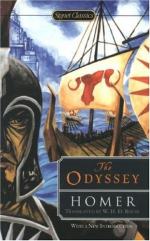At the end of the seventeenth century, doubts had begun to awaken on the subject, and we find Bentley remarking that “Homer wrote a sequel of songs and rhapsodies, to be sung by himself, for small comings and good cheer, at festivals and other days of merriment. These loose songs were not collected together, in the form of an epic poem, till about Peisistratus’ time, about five hundred years after.”
Two French writers—Hedelin and Perrault—avowed a similar scepticism on the subject; but it is in the “Scienza Nuova” of Battista Vico, that we first meet with the germ of the theory, subsequently defended by Wolf with so much learning and acuteness. Indeed, it is with the Wolfian theory that we have chiefly to deal, and with the following bold hypothesis, which we will detail in the words of Grote:—
“Half a century ago, the acute and valuable Prolegomena of F. A. Wolf, turning to account the Venetian Scholia, which had then been recently published, first opened philosophical discussion as to the history of the Homeric text. A considerable part of that dissertation (though by no means the whole) is employed in vindicating the position, previously announced by Bentley, amongst others, that the separate constituent portions of the Iliad and Odyssey had not been cemented together into any compact body and unchangeable order, until the days of Peisistratus, in the sixth century before Christ. As a step towards that conclusion, Wolf maintained that no written copies of either poem could be shown to have existed during the earlier times, to which their composition is referred; and that without writing, neither the perfect symmetry of so complicated a work could have been originally conceived by any poet, nor, if realized by him, transmitted with assurance to posterity. The absence of easy and convenient writing, such as must be indispensably supposed for long manuscripts, among the early Greeks, was thus one of the points in Wolf’s case against the primitive integrity of the Iliad and Odyssey. By Nitzsch, and other leading opponents of Wolf, the connection of the one with the other seems to have been accepted as he originally put it; and it has been considered incumbent on those who defended the ancient aggregate character of the Iliad and Odyssey, to maintain that they were written poems from the beginning.
“To me it appears, that the architectonic functions ascribed by Wolf to Peisistratus and his associates, in reference to the Homeric poems, are nowise admissible. But much would undoubtedly be gained towards that view of the question, if it could be shown, that, in order to controvert it, we were driven to the necessity of admitting long written poems, in the ninth century before the Christian aera. Few things, in my opinion, can be more improbable; and Mr. Payne Knight, opposed as he is to the Wolfian hypothesis, admits this no less than Wolf himself. The traces of writing in Greece, even in the seventh century before




